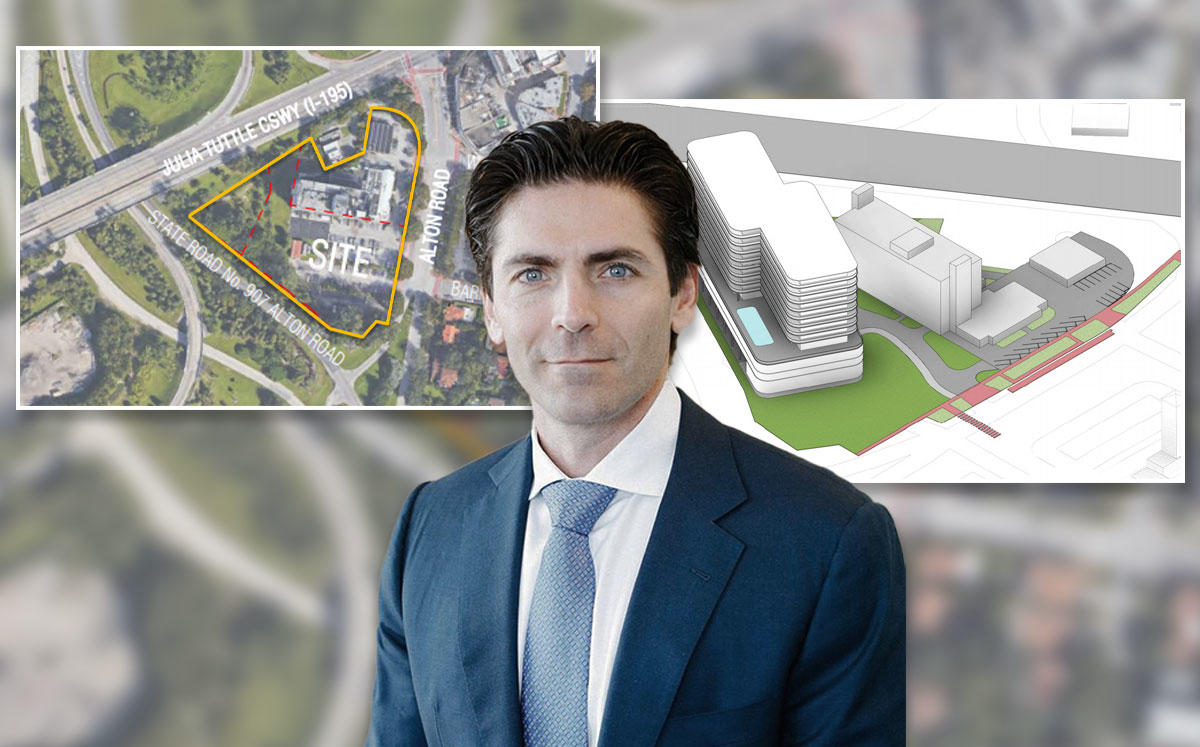Trending
Miami Beach board rejects Mast Capital’s plan to build 12-story tower
Most neighbors insist on maximum height of 85 feet, while board members question if site can be developed at all

Miami Beach’s Planning Board unanimously rejected Mast Capital CEO Camilo Miguel Jr.’s request for zoning changes that he needs to build a 12-story condo tower beside the Julia Tuttle Causeway.
The project, now called Alton Bay, at 4000 Alton Road in Mid-Beach, is actually smaller than the concept the developer presented to Miami Beach’s Land Use Committee three months ago. The previous plan called for a 290-foot tall, 25-story tower with 160 condo units. The newly presented design is 140-feet tall with 128 luxury condos.
Miguel said he “slashed the height by more than half” after receiving feedback from neighbors. “We have gained significant, but not unanimous, community support for this design,” Miguel said, adding that in exchange for approving his proposed overlay district, he would create a 1-acre publicly accessible park, improve water and sewer infrastructure, and enhance drainage on the site.
Nevertheless, 13 area residents, including former Miami Beach commissioner Kristen Rosen Gonzalez, and the pastor of St. Patrick’s Catholic Church across the street from the development site, spoke out against the project at the meeting on Tuesday. Most opponents argued that Mast Capital should build what’s currently allowed on the site: an 85-foot tall, 75-unit condo tower.
“This has to stop. This is our neighborhood,” said Mid-Beach resident Gina Russ. “A 140-foot tall tower is out of scale with the neighborhood. It will lead to other high-rise development on 41st Street, as we’ve seen in neighborhoods all over Miami Beach.”
Some planning board members wondered if Alton Bay can, or should, be developed on that site at all. Board member Daniel Veitia said that trying to build a high-rise on that particular parcel is out of context with an area dominated by single-family homes. Veitia also said it will be “messy” because Mast Capital’s land shares a 2.3-acre parcel with Talmudic University, which runs a yeshiva in a seven-story, ex-Howard Johnson hotel. Although Talmudic University and Mast Capital own different portions of the land, the city’s planning department considers the entire parcel as a unified development site. (Rabbi Yochanan Zweig, head of Talmudic University, was one of four people who spoke in favor of the project.)
“It’s a confusing application, it’s a confusing site, and I’m having a hard time getting past that,” Veitia said.
Planning board chairman Kareem Brantley pointed out that the proposed tower is less than 10 feet from Talmudic University’s property line. The envisioned Alton Bay tower is also very close to Talmudic University’s converted hotel building. “They are actually kissing almost,” Brantley said.
Veitia wasn’t thrilled about Mast Capital’s request that the city change the zoning of 17,680 square feet of land between the 195 Alton Ramp and the development site from “government use” to RM-2. Mast Capital is contracted to buy the land from the Florida Department of Transportation. By including the FDOT land in his project, Mast Capital creates a 3.4-acre unified development site. This also increases Mast Capital’s development rights by 35,360 square feet, according to a planning department staff report.
Board member Michael Barrineau suggested holding off on any zoning changes for 4000 Alton Road until a master plan for the nearby 41st Street commercial corridor is completed. “Maybe this parcel can be included in this conversation as part of a master plan,” Barrineau suggested.
Veitia thinks Mast Capital should probably buy out Talmudic University and redevelop it as a single, lower-scale project. “I don’t want to say, ‘no, no, no, no.’ I want to say ‘What is the best way to develop this site?’” Veitia said.
Board member David Wieder agreed. “[This] is like putting the mayonnaise first, slapping the bread together, and putting on the ingredients afterward,” he said.
Miguel said in a statement that Mast Capital was disappointed in the decision of the planning board, “particularly in light of the fact they chose to ignore the favorable recommendation of the city’s professional planning staff with respect to the majority of our proposal.”
He said the firm “will continue to collaborate with city staff to address some of the concerns raised by the planning board, work to reach mutual agreement with the city and obtain a favorable staff recommendation.”
The current proposed tower is the latest iteration the developer has planned for the site at 4000 Alton Road. In February 2016, Mast Capital launched sales of 3900 Alton, which was then planned as an eight-story, 78-unit condo development. It was slated to be completed in 2019. But those plans were scrapped.
In 2003, Talmudic University bought the entire 2.3-acre site for $8 million and turned it into its main campus. Faced with a foreclosure action, Talmudic University sold off a 1.9-acre chunk, consisting of a dirt parking lot and basketball court, to Mast Capital for $17.1 million in October 2014. Eight months prior to Mast Capital closing the purchase deal, the Miami Beach City Commission increased the height limit from 60 to 85 feet.
Despite the planning board’s rejection, Mast Capital’s rezoning application will still go before the Miami Beach City Commission for first reading on Sept. 16.




